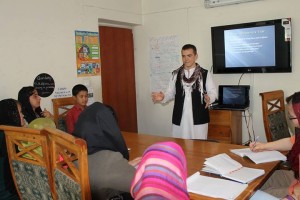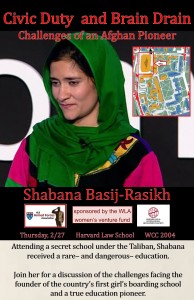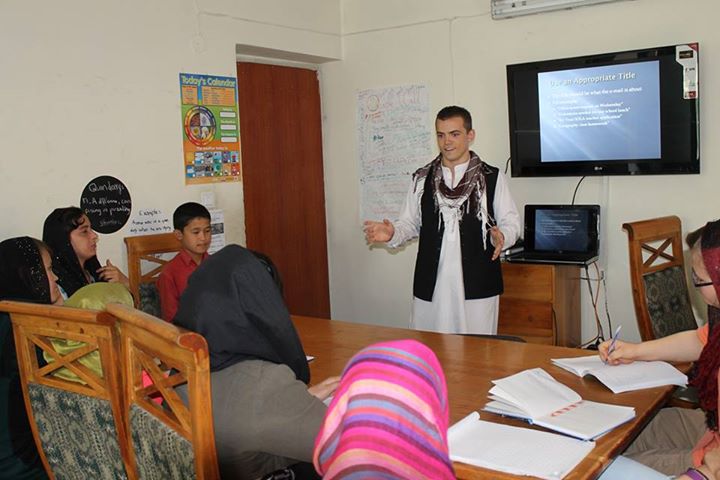 Now that I’m back on U.S. soil, I look back at my summer working and teaching at Afghanistan’s first girls boarding school, SOLA, and know that the summer was about more than imparting knowledge of continents, how to write an e-mail, and the present perfect verb tense. Educating girls who would have been executed—along with their teachers—a decade ago for going to school would be a worthwhile cause by itself, but SOLA is about more than educating a handful of gifted, lucky Afghans. The U.S. military and ISAF can’t force lasting change on Afghanistan through missiles or bullets. Afghans need be enabled to fix their own country, and the best way to do that is, and always has been, the education and empowerment of Afghan women.
Now that I’m back on U.S. soil, I look back at my summer working and teaching at Afghanistan’s first girls boarding school, SOLA, and know that the summer was about more than imparting knowledge of continents, how to write an e-mail, and the present perfect verb tense. Educating girls who would have been executed—along with their teachers—a decade ago for going to school would be a worthwhile cause by itself, but SOLA is about more than educating a handful of gifted, lucky Afghans. The U.S. military and ISAF can’t force lasting change on Afghanistan through missiles or bullets. Afghans need be enabled to fix their own country, and the best way to do that is, and always has been, the education and empowerment of Afghan women.
Educated women grow up with a broader view of the world, and so do their children. Education frees them from uncertainty, ignorance and poverty, each of which the Taliban requires to hold power. This why the Taliban has targeted hundreds of girls’ schools since the U.S. invaded in October, 2001, and why those schools need to continue to operate. Schools like SOLA in particular produce the college-educated leaders who can drive the enormous cultural shift and development necessary to ensure not only widespread access to education, but rejection of the brand of radical Islam and oppressive ideas that permeated Afghanistan before 2001. For that reason, there’s no battlefield more necessary to fight on than the one in thousands of classrooms across the struggling country.
On the one hand, my time in Afghanistan fills me with hope for the country’s future. I had experiences that few westerners ever have. I played a morning soccer game with 20 young Afghan men on a rock-filled dirt pitch and danced at a wedding with 1,200 guests, neither of which would have been possible under the Taliban. I ate dinner with a general in the Afghan army who has proudly seen all his daughters attend top colleges, and I was invited into the homes of Afghans, both rich and poor, and was exposed to their extreme generosity and hospitality. I saw new businesses opening and minds changing. I spoke to some of the government officials who work every day, under constant threat of death, to rebuild a country decimated by war, violence, and repression of both ideas and people.
I became friends with a young Afghan woman who saw both the backwards mindset of the past and the changing attitudes of the future as she courageously taught boys in their public schools – possibly for the first time – about respect for women. I saw dozens of young Afghans piled painfully into the back of a dump truck and others walking miles down steep mountain roads as they traveled to learn at distant schools in rural Panjshir province. I met fathers who drove across Afghanistan, putting their reputations and their lives at risk, in order to give their daughters a chance at a better life by delivering an application to SOLA.
I taught some of Afghanistan’s most gifted girls as they learned about an exciting world filled with diverse ideas and people. They told me over and over in moving, eloquent, English language about their desire for all Afghans – not just themselves – to receive an education.
On the other hand, when I visited Afghans’ homes, I traveled to them discreetly, knowing that each one of these hosts was risking violence to themselves and their families by inviting a foreigner in. Armed guards stood behind every gate and concertina wire wound around the top of the seemingly endless grid of fences and concrete barriers. I saw numerous Afghans missing eyes and limbs and entire sections of Kabul still in ruin from decades of war. Many days I remained indoors, listening and waiting for news that the most recent Taliban attack had ended as conflict continued to envelop the country.
I saw the girls I taught moved to tears as they described the difficulties they and their friends had to overcome simply to be in school and the powerful forces that fought to keep them out. After an attack, a 13-year-old girl calmly asked me “how many people died this time?” as if she were so used to news of death and violence that it could be discussed in the same tone as the weather forecast. During my stay I read that a prominent female police officer and a female senator were killed by the Taliban as the group struggled to silence those women who spoke the loudest against their ideas.
I learned that even among the new generation, which never really knew Taliban rule, many young men support the Taliban’s treatment of women and believe that any ills women suffer are because of their refusal to accept the oppressive code of behavior that effectively imprisoned them before 2001. Stories of forced underage marriages, rampant sexual harassment, and males forbidding schooling for female relatives were so commonplace they ceased to be shocking.
There are certainly times when I wonder if Afghanistan’s problems are simply too intractable to solve. However, each time a student asked me for an extra homework assignment to complete or story to read, or told me about how she had corrected a family member’s mistaken preconceptions of the world upon returning to her home in a distant province, I felt those doubts subside. This is an attempt worth making; a fight worth having.
Jeff Stern, a journalist for Atlantic Magazine who lived with me at SOLA, published a piece recently that echoes my thoughts on Afghanistan and how I view that country’s future.
“…The feeling I have is that the Taliban is facing a simple numbers problem. There are just too many people who’ve built houses here, too many people opening restaurants, too many people playing soccer, too many people learning new languages, too many people, for the Taliban to do more than insert slivers of violence into city life, to serve as a disruptive criminal syndicate settling scores, capable of terrific violence and trauma, but not of ever really coming back. Not of taking the country; not of any kind of writ beyond the places in the provinces where they have it now.
This is not to minimize the threat they pose, a threat which they are making good on with so much frequency that when a few days pass without an attack there’s a palpable feeling in the air that’s not altogether different from abandonment; suspense at least. And yet, on this night, Afghanistan is still out playing soccer and volleyball, getting stuck in rush hour, praying along to the soundtrack of the competing muezzin. So I allow myself this thought: maybe this is what winning will have to look like.”
But winning is not just rush-hour traffic, soccer and busy restaurants. It’s also henna flowers on hands, colorful headscarves drying on the clothesline, and the tiresome chorus from a Backstreet Boys song playing on repeat. From where I’m sitting, winning in Afghanistan looks an awful lot like a girls boarding school.


